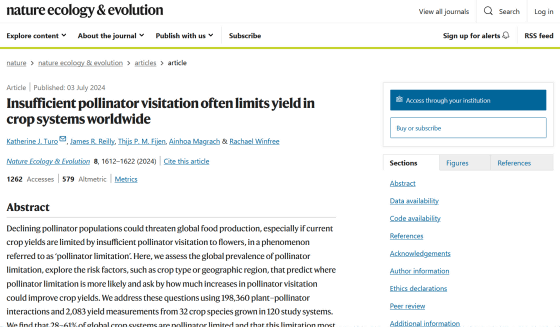Around 60% of the world's food crops, including coffee and apples, are suffering from a lack of pollinating insects.

Many
Insufficient pollinator visitation often limits yield in crop systems worldwide | Nature Ecology & Evolution
https://www.nature.com/articles/s41559-024-02460-2

Are Crops Worldwide Sufficiently Pollinated? | Rutgers University
https://www.rutgers.edu/news/are-crops-worldwide-sufficiently-pollinated
60% of Earth's Food Crops Aren't Being Visited by Enough Pollinators : ScienceAlert
https://www.sciencealert.com/60-of-earths-food-crops-arent-being-visited-by-enough-pollinators
Insect populations have been declining around the world in recent years, and in 2019, a group of insect enthusiasts reported that the total amount of insects caught had fallen by 76% over the past 30 years. Many food crops rely partly, if not entirely, on insects for pollination, so a decline in insect populations could have an impact on food production.
Crops that rely on insects for pollination include culturally important and nutritious crops such as fruits, vegetables, nuts and legumes. 'Look at a list of crops and think about which fruits and vegetables you look forward to eating the most,' says Katie Turo, a postdoctoral researcher in the School of Environmental and Biological Sciences at Rutgers University. 'Maybe it's berries in the summer or apples and squash in the fall. These are crops that generally require insect pollination.'

However, experimental evidence on the impact of pollinators on crops is lacking, and the impact of insect declines on the world's food supply is unclear. So Turo and his team analyzed data on pollinator visits to crops and pollination using a database called
CropPol is a global database that tracks 32 major pollinator-dependent commercial crops in 34 countries across Europe, North America, Latin America, the Caribbean, Asia, Oceania and Africa, collecting data on pollinator visits, rates of pollination and other relevant data.
The analysis found that 85 percent of the 34 countries where data was collected are experiencing pollinator shortages, with up to 60 percent of the world's crop systems adversely affected, across 25 crop species, with blueberries, coffee and apples reportedly being particularly hard hit.

On the other hand, the team estimates that closing the gap between fields with low and high pollinator visitation could reduce crop yields by 63%.
'Our findings bring both concern and optimism. Although we observed widespread crop yield shortfalls, we also estimate that with continued investment in pollinator management and research, we will likely be able to improve the efficiency of existing fields and meet the nutritional needs of the global population,' said Turo.
Related Posts:







